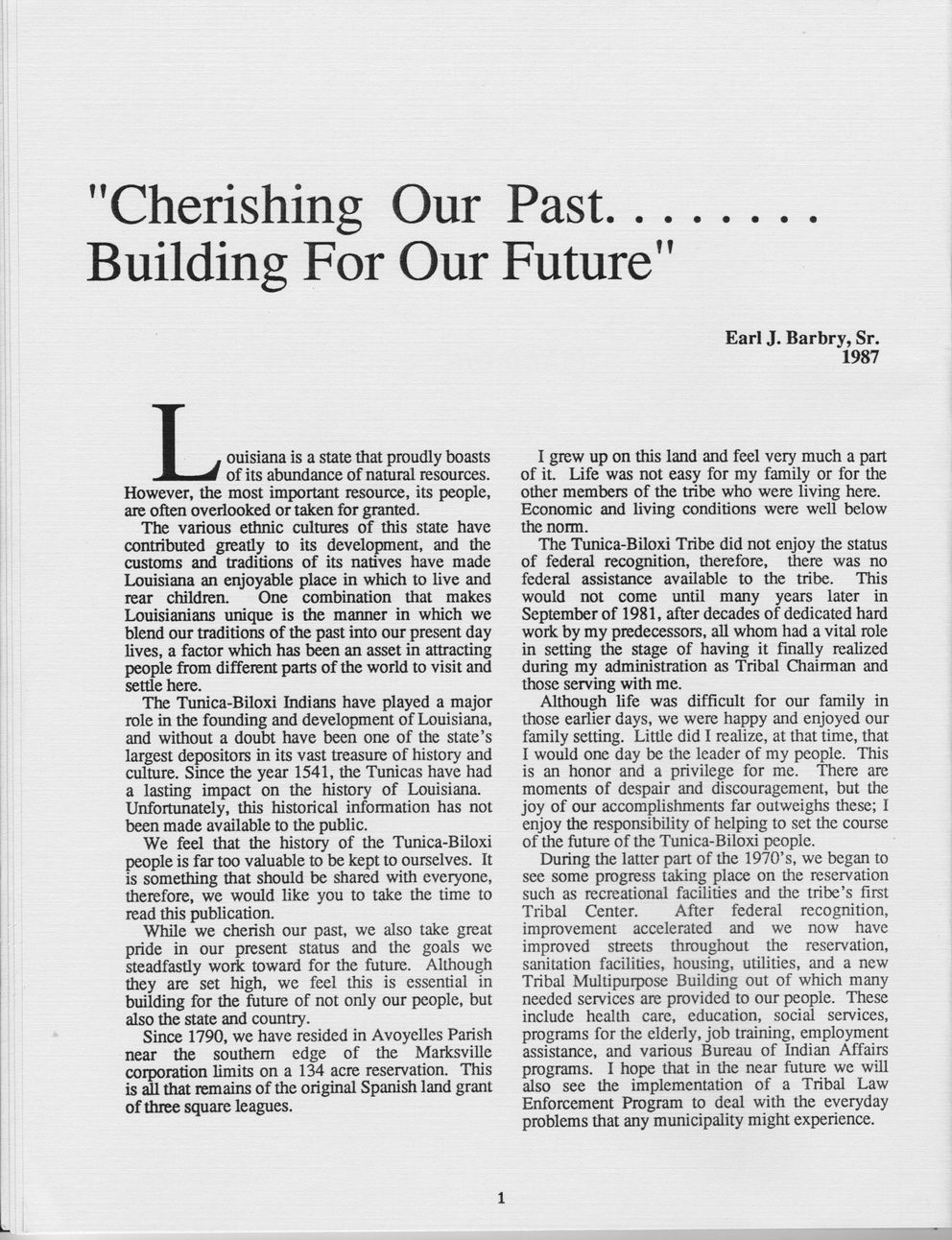This text was obtained via automated optical character recognition.
It has not been edited and may therefore contain several errors.
’’Cherishing Our Past. .. Building For Our Future" Earl J. Barbry, Sr. 1987 Louisiana is a state that proudly boasts of its abundance of natural resources. However, the most important resource, its people, are often overlooked or taken for granted. The various ethnic cultures of this state have contributed greatly to its development, and the customs and traditions of its natives have made Louisiana an enjoyable place in which to live and rear children. One combination that makes Louisianians unique is the manner in which we blend our traditions of the past into our present day lives, a factor which has been an asset in attracting people from different parts of the world to visit and settle here. The Tunica-Biloxi Indians have played a major role in the founding and development of Louisiana, and without a doubt have been one of the state’s largest depositors in its vast treasure of history and culture. Since the year 1541, the Tunicas have had a lasting impact on the history of Louisiana. Unfortunately, this historical information has not been made available to the public. We feel that the history of the Tunica-Biloxi people is far too valuable to be kept to ourselves. It is something that should be shared with everyone, therefore, we would like you to take the time to read this publication. While we cherish our past, we also take great pride in our present status and the goals we steadfastly work toward for the future. Although they are set high, we feel this is essential in building for the future of not only our people, but also the state and country. Since 1790, we have resided in Avoyelles Parish near the southern edge of the Marksville corporation limits on a 134 acre reservation. This is all that remains of the original Spanish land grant of three square leagues. I grew up on this land and feel very much a part of it. Life was not easy for my family or for the other members of the tribe who were living here. Economic and living conditions were well below the norm. The Tunica-Biloxi Tribe did not enjoy the status of federal recognition, therefore, there was no federal assistance available to the tribe. This would not come until many years later in September of 1981, after decades of dedicated hard work by my predecessors, all whom had a vital role in setting the stage of having it finally realized during my administration as Tribal Chairman and those serving with me. Although life was difficult for our family in those earlier days, we were happy and enjoyed our family setting. Little did I realize, at that time, that I would one day be the leader of my people. This is an honor and a privilege for me. There are moments of despair and discouragement, but the joy of our accomplishments far outweighs these; I enjoy the responsibility of helping to set the course of the future of the Tunica-Biloxi people. During the latter part of the 1970’s, we began to see some progress taking place on the reservation such as recreational facilities and the tribe’s first Tribal Center. After federal recognition, improvement accelerated and we now have improved streets throughout the reservation, sanitation facilities, housing, utilities, and a new Tribal Multipurpose Building out of which many needed services are provided to our people. These include health care, education, social services, programs for the elderly, job training, employment assistance, and various Bureau of Indian Affairs programs. I hope that in the near future we will also see the implementation of a Tribal Law Enforcement Program to deal with the everyday problems that any municipality might experience. 1

Native Americans The-Tunica-Biloxi-Tribe-its-Culture-and-People-(08)